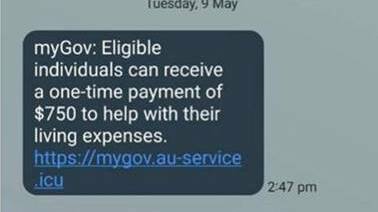A new scam is luring Australians to hand over their hard earned money by claiming to be associated with federal budget measures.
Scamwatch has issued a warning about a text circulating that states individuals can receive a one-time payment of $750 to help with living expenses. The text appears to come from myGov.
The federal budget, announced this week, involved a suite of cost of living relief, including $500 energy relief payments for eligible households.

An ACCC spokesperson said myGov scams are becoming increasingly frequent.
“myGov scams reported to Scamwatch are predominantly received via text message and to a lesser degree, emails that contain hyperlinks to a fake myGov login page,” the spokesperson said.
“The intent is for scammers to harvest login credentials to facilitate identity takeover and commit fraud. They may also use the fake login page to gain more personal identifying information such as financial details or get the victim to complete an form. They may suggest a problem with your account, a tax refund or grant is available.”
Total losses to phone and text scams increased significantly in 2022 with over $169 million lost, according to Scamwatch.
The Australian Cyber Security Centre’s Annual Cyber Threat Report for 2022 estimated that a cybercrime is reported every seven minutes with fraud, online shopping and online banking reported as the top types of cybercrimes.
The ACCC spokesperson warned Australians never to access myGov via a hyperlink. All legitimate messages from myGov will be visible in the official myGov inbox.
Scams are on the rise with some Australians losing their life savings after falling victim to sophisticated scams.
AFL star Jacob Weitering recently announced that he had lost significant amounts of money to a scam after being told his accounts were frozen and his money needed to be transferred to a safeguarding account.
Phishing scams were the most common scam reported to Scamwatch in 2022 with 74,573 phishing scam reports received.
Financial losses from phishing scams was $24.6 million in 2022.

